May/2022 Latest Braindump2go DP-900 Exam Dumps with PDF and VCE Free Updated Today! Following are some new DP-900 Real Exam Questions!
QUESTION 162
Which statement is an example of Data Manipulation Language (DML)?
A. REVOKE
B. DISABLE
C. CREATE
D. UPDATE
Answer: D
Explanation:
Data Manipulation Language (DML) affect the information stored in the database. Use these statements to insert, update, and change the rows in the database.
BULK INSERT
DELETE
INSERT
SELECT
UPDATE
MERGE
Reference:
https://docs.microsoft.com/en-us/sql/t-sql/statements/statements
QUESTION 163
You need to create an Azure resource to store data in Azure Table storage.
Which command should you run?
A. az scorage share create
B. az scorage account creace
C. az cosmosdb creace
D. az scorage concainer creace
Answer: D
Explanation:
https://docs.microsoft.com/en-us/cli/azure/storage/container?view=azure-cli-latest
QUESTION 164
You need to modify a view in a relational database by adding a new column.
Which statement should you use?
A. MERGE
B. ALTER
C. INSERT
D. UPDATE
Answer: B
QUESTION 165
Which statement is an example of Data Definition Language (DDL)?
A. SELECT
B. INSERT
C. DELETE
D. DROP
Answer: D
Explanation:
Data Definition Language (DDL) statements defines data structures. Use these statements to create, alter, or drop data structures in a database. These statements include:
ALTER
Collations
CREATE
DROP
DISABLE TRIGGER
ENABLE TRIGGER
RENAME
UPDATE STATISTICS
TRUNCATE TABLE
Reference:
https://docs.microsoft.com/en-us/sql/t-sql/statements/statements
QUESTION 166
You need to store data by using Azure Table storage.
What should you create first?
A. an Azure Cosmos DB instance
B. a storage account
C. a blob container
D. a table
Answer: B
Explanation:
First create an Azure storage account, then use Table service in the Azure portal to create a table.
Note: An Azure storage account contains all of your Azure Storage data objects: blobs, files, queues, and tables.
Reference:
https://docs.microsoft.com/en-us/azure/storage/tables/table-storage-quickstart-portal
https://docs.microsoft.com/en-us/azure/storage/common/storage-account-create
QUESTION 167
You need to recommend a data store service that meets the following requirements:
– Native SQL API access
– Configurable indexes
What should you recommend?
A. Azure Files
B. Azure Blob storage
C. Azure Table storage
D. Azure Cosmos DB
Answer: D
Explanation:
Azure Cosmos DB comes with native Core (SQL) API support.
In Azure Cosmos DB, data is indexed following indexing policies that are defined for each container. The default indexing policy for newly created containers enforces range indexes for any string or number. This policy can be overridden with your own custom indexing policy.
Reference:
https://docs.microsoft.com/en-us/azure/cosmos-db/sql/how-to-manage-indexing-policy
QUESTION 168
Your company needs to design a database that illustrates the relationships between utilization levels of individual network devices across a local area network.
Which type of data store should you use?
A. graph
B. key/value
C. document
D. columnar
Answer: A
Explanation:
Data as it appears in the real world is naturally connected. Traditional data modeling focuses on defining entities separately and computing their relationships at runtime. While this model has its advantages, highly connected data can be challenging to manage under its constraints.
A graph database approach relies on persisting relationships in the storage layer instead, which leads to highly efficient graph retrieval operations. Azure Cosmos DB’s Gremlin API supports the property graph model.
Reference:
https://docs.microsoft.com/en-us/azure/cosmos-db/graph-introduction#introduction-to-graph-databases
QUESTION 169
What is the primary purpose of a data warehouse?
A. to provide answers to complex queries that rely on data from multiple sources
B. to provide transformation services between source and target data stores
C. to provide read-only storage of relational and non-relational historical data
D. to provide storage for transactional line-of-business (LOB) applications
Answer: C
Explanation:
Consider using a data warehouse when you need to keep historical data separate from the source transaction systems for performance reasons. Data warehouses make it easy to access historical data from multiple locations, by providing a centralized location using common formats, keys, and data models.
Query both relational and nonrelational data.
Reference:
https://docs.microsoft.com/en-us/azure/architecture/data-guide/relational-data/data-warehousing
QUESTION 170
Drag and Drop Question
Your company plans to load data from a customer relationship management (CRM) system to a data warehouse by using an extract, load, and transform (ELT) process.
Where does data processing occur for each stage of the ELT process? To answer, drag the appropriate locations to the correct stages. Each location may be used once, more than once, or not at all. You may need to drag the split bar between panes or scroll to view content.
NOTE: Each correct selection is worth one point.

Answer:

Explanation:
Box 1: The CRM system
Data is extracted from the CRM system.
Box 2: The data warehouse
Data is loaded to the data warehouse.
Box 3: A standalone data analysis tool
The data transformation that takes place usually involves various operations, such as filtering, sorting, aggregating, joining data, cleaning data, deduplicating, and validating data.
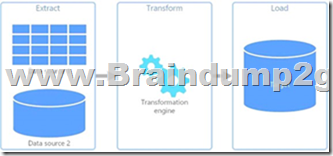
Reference:
https://docs.microsoft.com/en-us/azure/architecture/data-guide/relational-data/etl
QUESTION 171
Hotspot Question
To complete the sentence, select the appropriate option in the answer area.

Answer:

Explanation:
Descriptive, to answer the question: What’s happening?
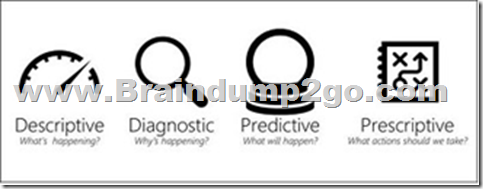
Note: Azure Media Indexer enables you to make content of your media files searchable and to generate a full-text transcript for closed captioning and keywords. You can process one media file or multiple media files in a batch.
Reference:
https://demand-planning.com/2020/01/20/the-differences-between-descriptive-diagnostic-predictive-cognitive-analytics/
https://azure.microsoft.com/en-us/blog/answering-whats-happening-whys-happening-and-what-will-happen-with-iot-analytics/
https://docs.microsoft.com/en-us/azure/media-services/previous/media-services-index-content
QUESTION 172
Hotspot Question
To complete the sentence, select the appropriate option in the answer area.

Answer:

QUESTION 173
Hotspot Question
To complete the sentence, select the appropriate option in the answer area.

Answer:

Explanation:
With ELT, the data store used to perform the transformation is the same data store where the data is ultimately consumed.
Reference:
https://docs.microsoft.com/en-us/azure/architecture/data-guide/relational-data/etl
QUESTION 174
Hotspot Question
To complete the sentence, select the appropriate option in the answer area.

Answer:

Explanation:
Azure Cosmos DB SQL API accounts provide support for querying items using the Structured Query Language (SQL) syntax.
Reference:
https://docs.microsoft.com/en-us/azure/cosmos-db/choose-api
QUESTION 175
Hotspot Question
For each of the following statements, select Yes if the statement is true. Otherwise, select No.
NOTE: Each correct selection is worth one point.
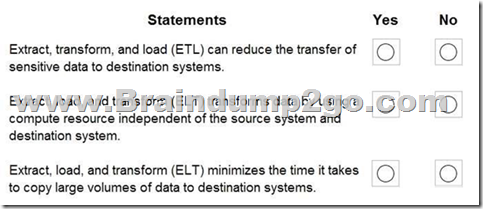
Answer:
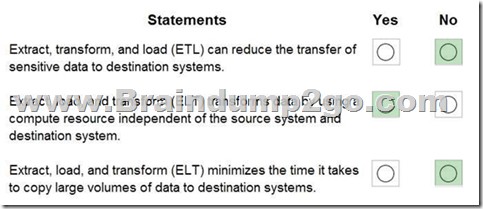
Explanation:
https://docs.microsoft.com/en-us/azure/architecture/data-guide/relational-data/etl
QUESTION 176
Hotspot Question
You plan to deploy a PostgreSQL database to Azure.
Which hosting model corresponds to the available deployment options? To answer, select the appropriate options in the answer area.
NOTE: Each correct selection is worth one point.
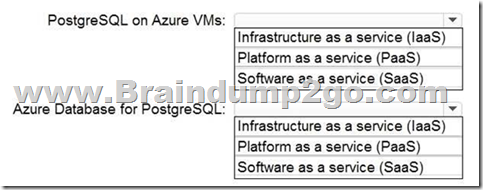
Answer:
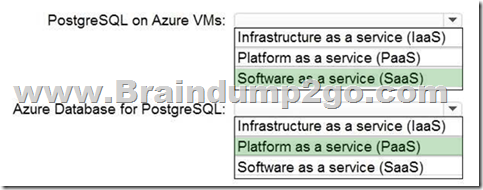
Explanation:
https://azure.microsoft.com/en-us/overview/what-is-saas/
QUESTION 177
Hotspot Question
To complete the sentence, select the appropriate option in the answer area.

Answer:

QUESTION 178
Hotspot Question
To complete the sentence, select the appropriate option in the answer area.

Answer:

QUESTION 179
Hotspot Question
To complete the sentence, select the appropriate option in the answer area.

Answer:

Explanation:
https://docs.microsoft.com/en-us/sql/relational-databases/indexes/clustered-and-nonclustered-indexes-described?view=sql-server-ver15
Resources From:
1.2022 Latest Braindump2go DP-900 Exam Dumps (PDF & VCE) Free Share:
https://www.braindump2go.com/dp-900.html
2.2022 Latest Braindump2go DP-900 PDF and DP-900 VCE Dumps Free Share:
https://drive.google.com/drive/folders/1L1Swg242dV2heEY8KHLG49Z8Cd0UEiQa?usp=sharing
3.2021 Free Braindump2go DP-900 Exam Questions Download:
https://www.braindump2go.com/free-online-pdf/DP-900-PDF-Dumps(162-179).pdf
Free Resources from Braindump2go,We Devoted to Helping You 100% Pass All Exams!